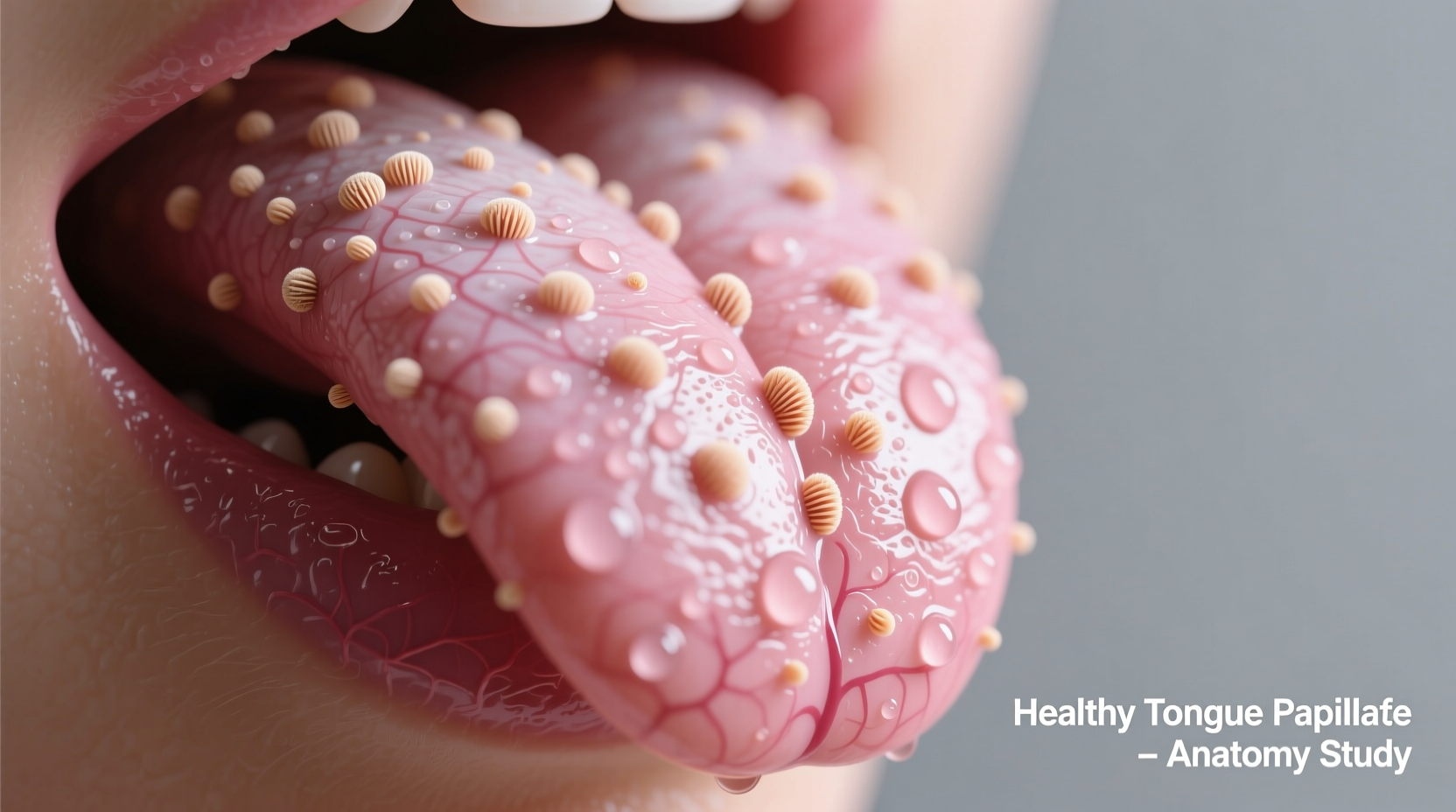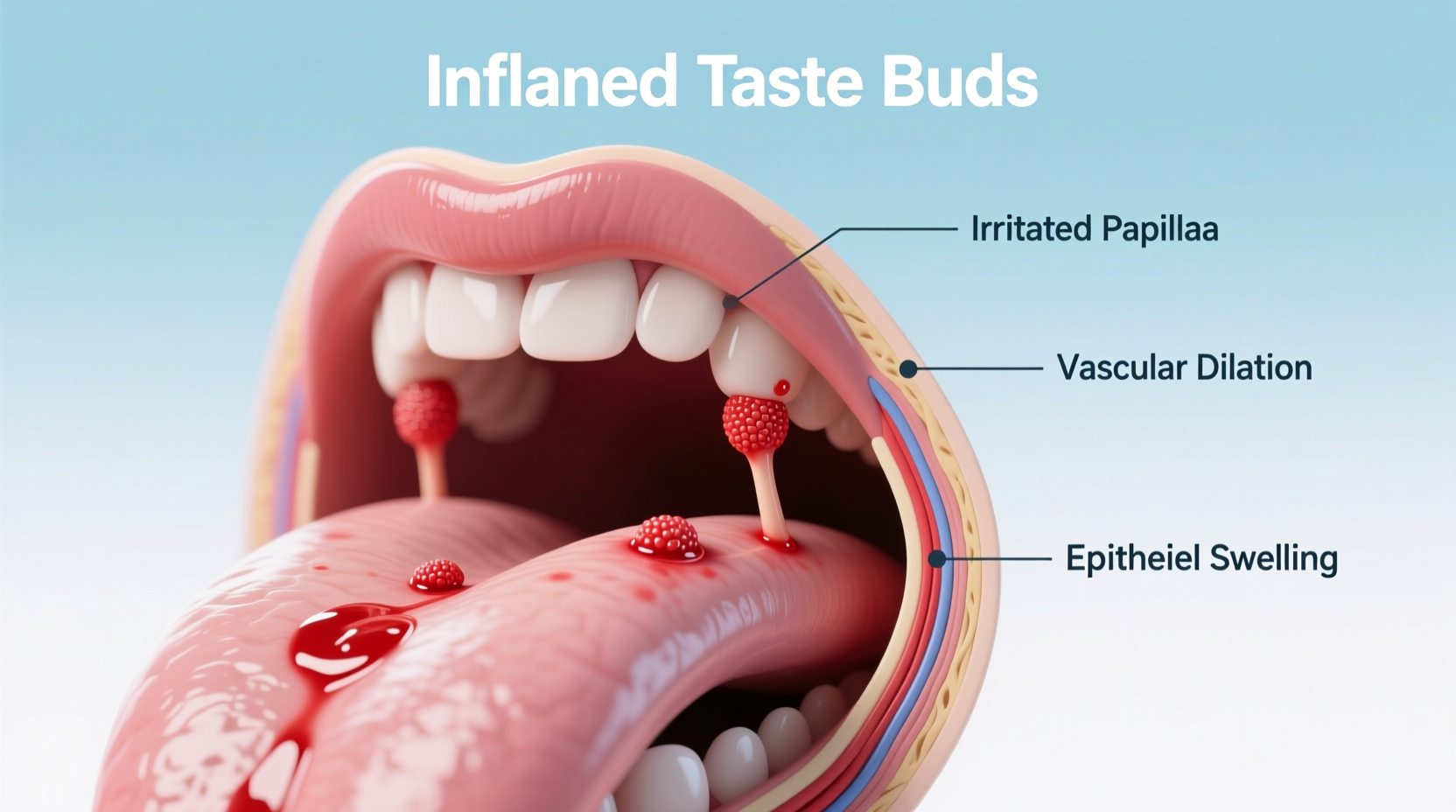Inflamed taste buds are primarily caused by thermal burns from hot foods/drinks, acidic foods and beverages, spicy irritants, allergic reactions, oral infections like thrush, nutritional deficiencies (particularly B vitamins and iron), smoking, alcohol consumption, dental appliance irritation, and certain autoimmune conditions. Most cases resolve within 7-10 days with proper care.
Understanding Inflamed Taste Buds: More Than Just Spicy Food
Those painful red or white bumps on your tongue aren't actually your taste buds themselves inflaming—they're your papillae, the tiny structures that house your taste buds. When these become irritated or swollen, they create that uncomfortable burning sensation that makes eating and drinking unpleasant. Understanding what causes inflamed taste buds is the first step toward relief and prevention.
Why Your Taste Buds React: The Science Behind the Swelling
Taste buds naturally regenerate every 10-14 days as part of your body's normal cellular turnover. When irritation occurs, this process gets disrupted, causing inflammation in the surrounding tissue. The papillae become enlarged and sometimes filled with fluid, creating those noticeable bumps. This inflammation is your body's protective response to potential damage.
Top 8 Causes of Inflamed Taste Buds Revealed
1. Thermal Burns from Hot Foods and Drinks
Consuming foods or beverages above 140°F (60°C) can scald your tongue's delicate tissue. Coffee, tea, and soups are common culprits. The heat damages the papillae, triggering inflammation as your body works to heal the injury. This what causes inflamed taste buds after that too-hot latte.
2. Acidic and Spicy Food Irritation
Foods with high acidity like citrus fruits, tomatoes, and vinegar can erode the protective mucus layer on your tongue. Similarly, capsaicin in spicy foods activates pain receptors, causing inflammation. Maya Gonzalez, our Latin American cuisine specialist with expertise in chili varieties, explains: "Different chilies affect the mouth in unique ways—some create immediate burning while others produce delayed inflammation that might not appear until hours later. Understanding what causes inflamed taste buds from specific spice varieties helps prevent discomfort."
3. Nutritional Deficiencies Impacting Oral Health
Deficiencies in B vitamins (especially B12, B3, and B9), iron, and zinc directly affect tongue health. According to the National Institutes of Health, vitamin B12 deficiency causes glossitis—tongue inflammation that often presents as swollen taste buds. Research shows these nutrients are essential for healthy cell regeneration in your mouth.
4. Oral Infections and Microbial Imbalances
Oral thrush (a yeast infection), viral infections like hand-foot-and-mouth disease, and bacterial infections can all cause inflamed taste buds. The American Dental Association notes that changes in your oral microbiome often precede these inflammatory responses. What causes inflamed taste buds in these cases is your immune system's reaction to the invading pathogens.
When Inflammation Signals Something Serious
While most inflamed taste buds resolve quickly, certain patterns warrant medical attention. Use this timeline to understand what's normal and what's concerning:
| Cause Type | Typical Duration | When to Seek Help |
|---|---|---|
| Thermal burns | 3-5 days | After 7 days with no improvement |
| Acidic/spicy irritation | 2-4 days | Pain worsening after 48 hours |
| Nutritional deficiencies | Weeks to months | Recurring inflammation without clear cause |
| Infections | 7-14 days | White patches, fever, or spreading redness |
Practical Relief Strategies That Actually Work
When you're experiencing inflamed taste buds, these evidence-based approaches provide real relief:
Dietary Adjustments for Immediate Comfort
- Avoid temperatures above 120°F (49°C) until healed
- Eliminate citrus, tomatoes, and vinegar-based foods temporarily
- Choose bland, soft foods like oatmeal, bananas, and yogurt
- Stay hydrated with cool (not cold) water
Oral Care Practices That Speed Healing
Rinse with a saltwater solution (1/2 teaspoon salt in 8oz warm water) 3-4 times daily. This what causes inflamed taste buds to heal faster by reducing bacteria and inflammation. The Mayo Clinic recommends this simple remedy as a first-line approach for oral irritation.

Preventing Recurring Inflammation
Maintain optimal oral health with these preventive measures:
- Use a soft-bristled toothbrush to avoid mechanical irritation
- Consider a tongue scraper for gentle daily cleaning
- Address nutritional gaps with a balanced diet or supplements
- Manage stress, which can trigger oral inflammation
When Home Care Isn't Enough: Medical Interventions
If your inflamed taste buds persist beyond two weeks or worsen, consult a healthcare provider. They may recommend:
- Prescription antifungal treatments for oral thrush
- Nutritional supplements for deficiencies
- Topical anesthetics for severe pain
- Testing for underlying conditions like oral lichen planus
Understanding Your Body's Warning Signals
Recurring inflamed taste buds often indicate patterns worth investigating. Track your symptoms alongside your diet and habits to identify personal triggers. What causes inflamed taste buds for one person might differ significantly from another's experience—your body's response provides valuable information about your overall health.











 浙公网安备
33010002000092号
浙公网安备
33010002000092号 浙B2-20120091-4
浙B2-20120091-4